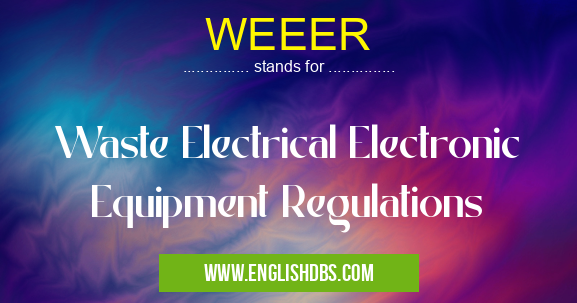What does WEEER mean in ELECTRONICS
WEEE stands for Waste Electrical and Electronic Equipment Regulations. These regulations were established by the European Union (EU) to address the growing problem of electronic waste (e-waste). E-waste is a rapidly growing waste stream, and it poses a number of environmental and health risks.

WEEER meaning in Electronics in Academic & Science
WEEER mostly used in an acronym Electronics in Category Academic & Science that means Waste Electrical Electronic Equipment Regulations
Shorthand: WEEER,
Full Form: Waste Electrical Electronic Equipment Regulations
For more information of "Waste Electrical Electronic Equipment Regulations", see the section below.
WEEER Meaning in Science
WEEE regulations aim to reduce the amount of e-waste that is generated, and to ensure that e-waste is disposed of in an environmentally sound manner. The regulations require producers of electrical and electronic equipment to take back and recycle their products at the end of their useful life.
WEEER Full Form
Waste Electrical Electronic Equipment Regulations
What Does WEEER Stand For?
- To reduce the amount of e-waste that is generated.
- To ensure that e-waste is disposed of in an environmentally sound manner.
- To require producers of electrical and electronic equipment to take back and recycle their products at the end of their useful life.
Essential Questions and Answers on Waste Electrical Electronic Equipment Regulations in "SCIENCE»ELECTRONICS"
What are WEEE Regulations?
The Waste Electrical and Electronic Equipment (WEEE) Regulations are a set of European Union (EU) regulations designed to minimize the environmental impact of discarded electrical and electronic equipment (EEE). These regulations require manufacturers, distributors, and consumers to take responsibility for the collection, recycling, and disposal of EEE waste.
What is the purpose of WEEE Regulations?
The purpose of WEEE Regulations is to:
- Reduce the amount of EEE waste sent to landfills and incinerators.
- Promote the recycling and recovery of valuable materials from EEE waste.
- Protect human health and the environment from the hazardous substances contained in EEE waste.
What is considered EEE waste?
EEE waste includes a wide range of electrical and electronic devices, such as:
- Computers, laptops, and tablets
- Televisions, monitors, and DVD players
- Refrigerators, freezers, and washing machines
- Microwave ovens, toasters, and kettles
- Mobile phones, smartphones, and digital cameras
What should I do with my old EEE equipment?
When you no longer need your EEE equipment, you should dispose of it responsibly. You can:
- Take it to a WEEE recycling center.
- Return it to the manufacturer or retailer where you purchased it.
- Use a certified waste management company.
Are there any penalties for not complying with WEEE Regulations?
Yes, there can be penalties for not complying with WEEE Regulations. These penalties can vary depending on the country and the severity of the violation.
Final Words: WEEER regulations are an important part of the EU's efforts to reduce e-waste and protect the environment. By reducing the amount of e-waste that is generated, and by ensuring that e-waste is disposed of in an environmentally sound manner, WEEE regulations help to protect the environment and human health.
